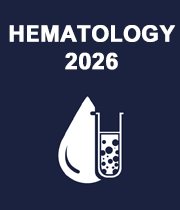Title : Similarities of antiphospholipid antibodies in HIT and APS patients with heparin-platelet factor 4 antibodies
Abstract:
Heparin-induced thrombocytopenia (HIT) is a prothrombotic autoimmune disorder confirmed by the existence of Heparin-Platelet Factor 4 (HPF4) antibodies. The aim of this work is to study the possible relationship between anti-HPF4 and antiphospholipid antibodies (aPLs) that may explain the discrepancies observed in patients with a suspected HIT (HIT group) with positive immunoassay (HPF4-Elisa) and negative functional assay (heparin induced platelet aggregation test). So, we performed H-PF4 antibodies research in 31 APS confirmed patients (APL group). All tests performed have been compared to normal controls (n = 34). We found anti-H-PF4 in 7/31 patients of APL group. In parallel, we search for aPLs in 9/34 patients tested positive for anti-HPF4 in HIT group, all of them were positive. All specificities were observed in the two antiHPF4 positive groups (aβ2GP1 IgM/IgG/IgA, aCL (IgM/IgG/IgA, aPS-PT IgM/IgG). The most associated antibodies with anti-HPF4 are the anti ß2Glycoprotein1 (Odds ratio = 50.1). We suggest that the presence of aPLs in HIT group with anti-HPF4 could be the cause of the discrepancies. In addition, we performed the Heparin Neutralization Assay (HNA) which is specific for anti-HPF4, neutralization was obtained for patients exposed to heparin. Furthermore, we suggest that we should performed a larger cohort to confirm the causal relationship of aPLs and also to expand the tests allowing the differentiation between these autoantibodies.
Audience Takeaway:
- This presentation allows the audience to gain knowledge about HIT diagnosis and especially abouts the discrepancies between HIT diagnosis tests, that could be encountered in their laboratory routine as scientists. In addition, it may help to better understand these diagnostic discrepancies taking into account the commonalities between antiphospholipid syndrome and Heparin-induced thrombocytopenia.
- It could guide the audience to a better diagnostic approach in case of discrepancies in HIT tests by suggesting a diagnostic algorithm.
- This research is a hypothesis of the role of Antiphospholipid antibodiesin HIT diagnosis, which deserves to be extended with integration of extensive tests. For these reasons, this work should be used by other faculty.
- This research provides a practical solution of the observed discrepancies in HIT diagnosis, which is a practical diagnosis algorithm, which seems to be a better alternative and more efficient that some tests, requiring specific conditions. Sample Abstract Template
- This work provides new information about the discrepancies in HIT diagnosis: antiphospholipid antibodies could explain the discrepancies observed between HIT diagnosis tests based on the known commonalities between HIT and APS in terms of an autoimmune pathophysiologic mechanism. It will improve the accuracy of HIT diagnosis by a better use of the widely immunoassays: the HPF4-ELISA and a limited use of the functional testing by addition of other parameters and tests.



